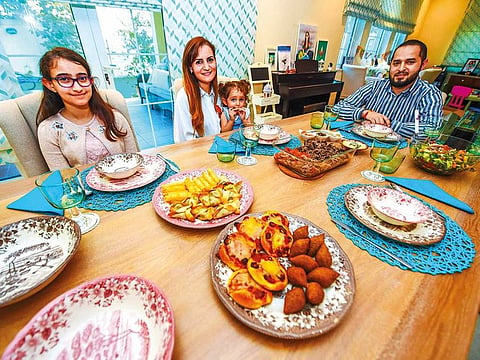Family iftar with a ‘girl on fire’ in Dubai
Lynn and her Lebanese parents share their inspirational story over a select meal

Dubai: Dubai-based Lynn Ziad Gaziri, 12, has been doing the Ramadan fast for the past five years. From giving up her favourite food when she was seven and undertaking half-day fasts a year later, to full-fledged fasting for two Ramadans now, her abstinence from food has progressively increased over time.
Nothing unusual about that, as most children learn to fast in this manner. But the fact that Lynn is a ‘girl on fire’ who burns in her own skin makes all the difference. Suffering from a rare disease called Erythromelalgia or EM, where her hands and feet suddenly flare, she is an EM warrior in more ways than one.
“I am amazed at her resolve,” says Lynn’s mum Youmna. “Last year, she managed to fast better than I did as I was still breastfeeding her little sister, Lara. This year, she made it clear that I should ensure she is not asleep during suhoor.”
As Youmna and her husband Ziad, both from Lebanon, get ready for iftar at their south Dubai home with their two daughters, the spread on the table is very select — there’s fattoush salad, lentil soup, rakakat and shawarma with houmous, potato fries and pita bread.
Ramadan, a time of spirituality
While the salad and soup have been a constant every day during Ramadan, the appetiser and main course change depending on what’s available. Rakakat, for instance can be replaced by falafal or shawarma by kafta or kibbe.
“Ramadan for us is not about food, it’s more to do with spirituality,” says Youmna after the family completes its prayer. “We’ve made a conscious decision to keep our iftars light, spend less time in the kitchen and focus more on prayer and community service. There’s no need to over-cook and over-stuff ourselves. After midnight, we may have something light again, like a sandwich with some laban or juice,” she adds.
We make an average of 50 bags a day, sometimes even 100, if we get extra help. It takes us a couple of hours and we assign ourselves duties which we take very seriously. It’s a lot of fun too as we keep tabs on who can manage more bags, and even do a quality check. Lynn really enjoys the tasks and so do we.Youmna
Part of the community service revolves round making iftar packages for the Ramadan Fridge initiative. Lynn says it’s a time for deep bonding with her parents as they sit together and pack the bags. The bags contain set portions of canned foods, chocolate biscuits, milk, juice, fresh fruit, vegetables and noodles — all purchased from the market.
“We make an average of 50 bags a day, sometimes even 100, if we get extra help. It takes us a couple of hours and we assign ourselves duties which we take very seriously. It’s a lot of fun too as we keep tabs on who can manage more bags, and even do a quality check. Lynn really enjoys the tasks and so do we,” says Youmna, adding how her daughter even makes hygiene packs and distributes them to the workers all-year round.
But with Lynn’s unpredictable and uncurable disease playing up sometimes, not every day is a smooth sail.
An attack of EM means Lynn’s skin swells and turns red hot, as she writhes in excruciating pain. She becomes utterly helpless as her toes and fingers get stiff. Lynn dips her feet and hands in cold water, but the water can get warm from her burning skin.
How EM affects iftar time
Yet, the EM warrior who is a homeschooler, has learnt to manage her condition. She turns on the air-conditioner to its coldest temperature and waits till the flares subside. She also takes some medication for pain. “If she can, she joins us for iftar, otherwise I set aside the food for her and she has it when she is ready.”
As the family copes with the ups and downs, Youmna says she and her husband are heartened by Lynn’s maturity and commitment to her chosen cause. “She pushes hard even on a bad day. She says she will be fine and it will be worth the effort. All that matters to her are the smiles of those who receive her iftar packages.”
Youmna says in a place like Dubai, where luxury comes easy, it is essential that children remain grounded and don’t take the things they have for granted.
“Ramadan is a time that helps us reflect on such matters and act on them to the extent we can,” she adds.
RECIPE:
Beef Shawarma
Beef — 1kg (cut in thin strips)
Onions — 3
Tomatoes — 3
Ready-made shawarma spices — as per taste
Salt — As per taste
Pepper — As per taste
Olive oil — 3-4 tablespoons
Vinegar — 1-2 teaspoons
Method:
Marinate the beef with shawarma spices, salt, pepper, vinegar and olive oil overnight.
Marinate onion in olive oil for half-hour.
Put the beef on one side on a baking tray, sliced onion and tomatoes on another side. Bake on medium heat for 30-35 minutes.
Transfer into a serving bowl and serve hot with houmous, potato fries and pita bread.



